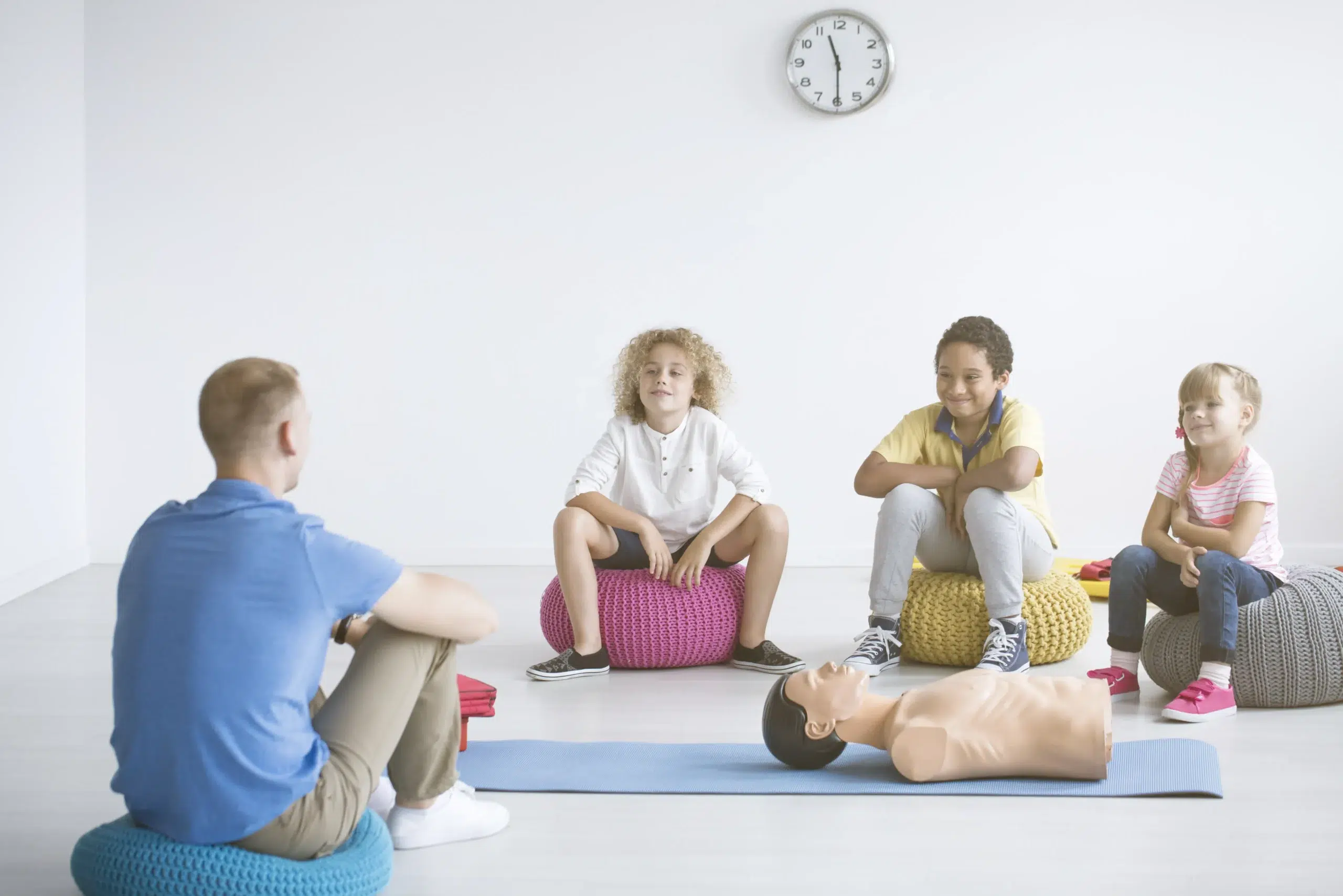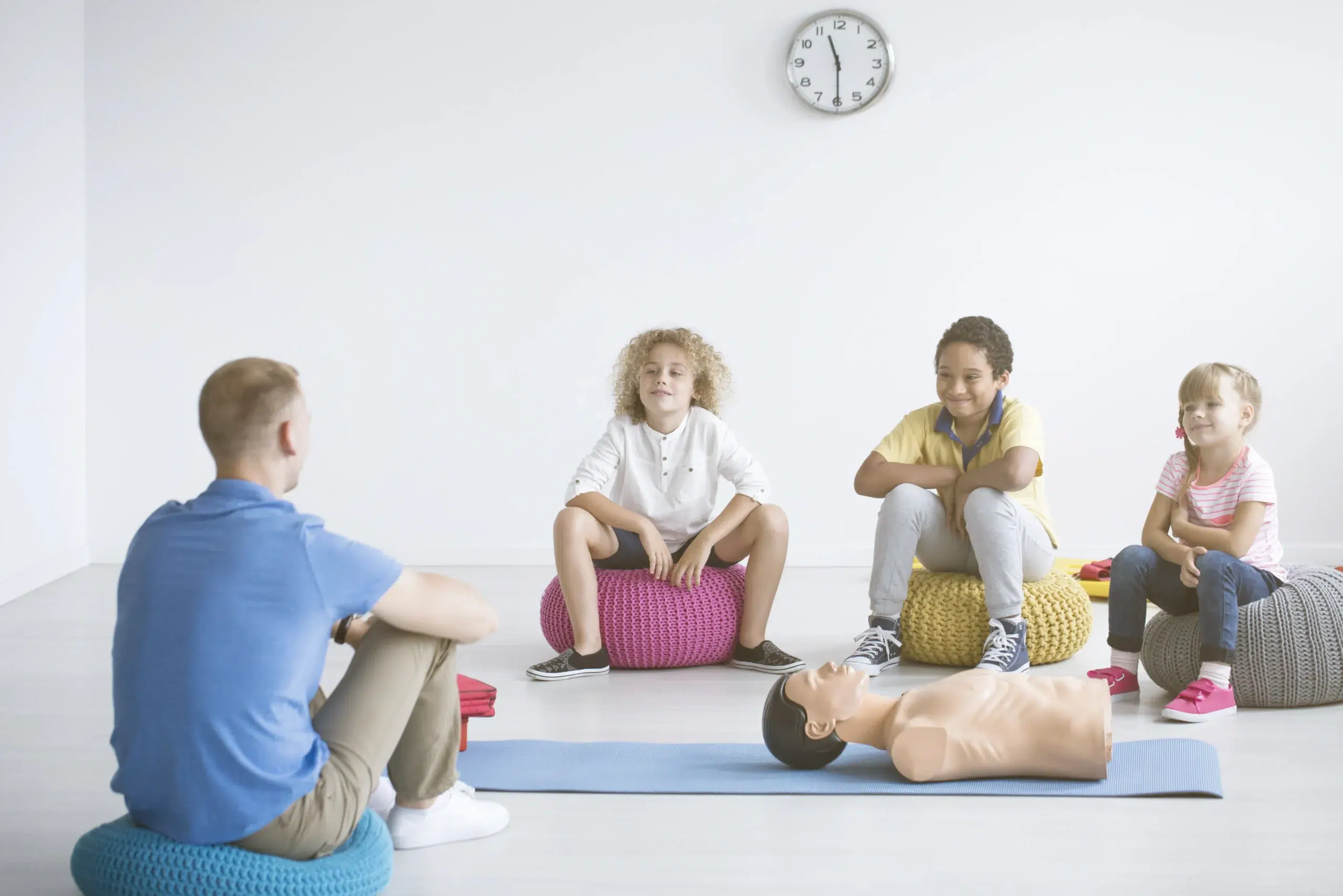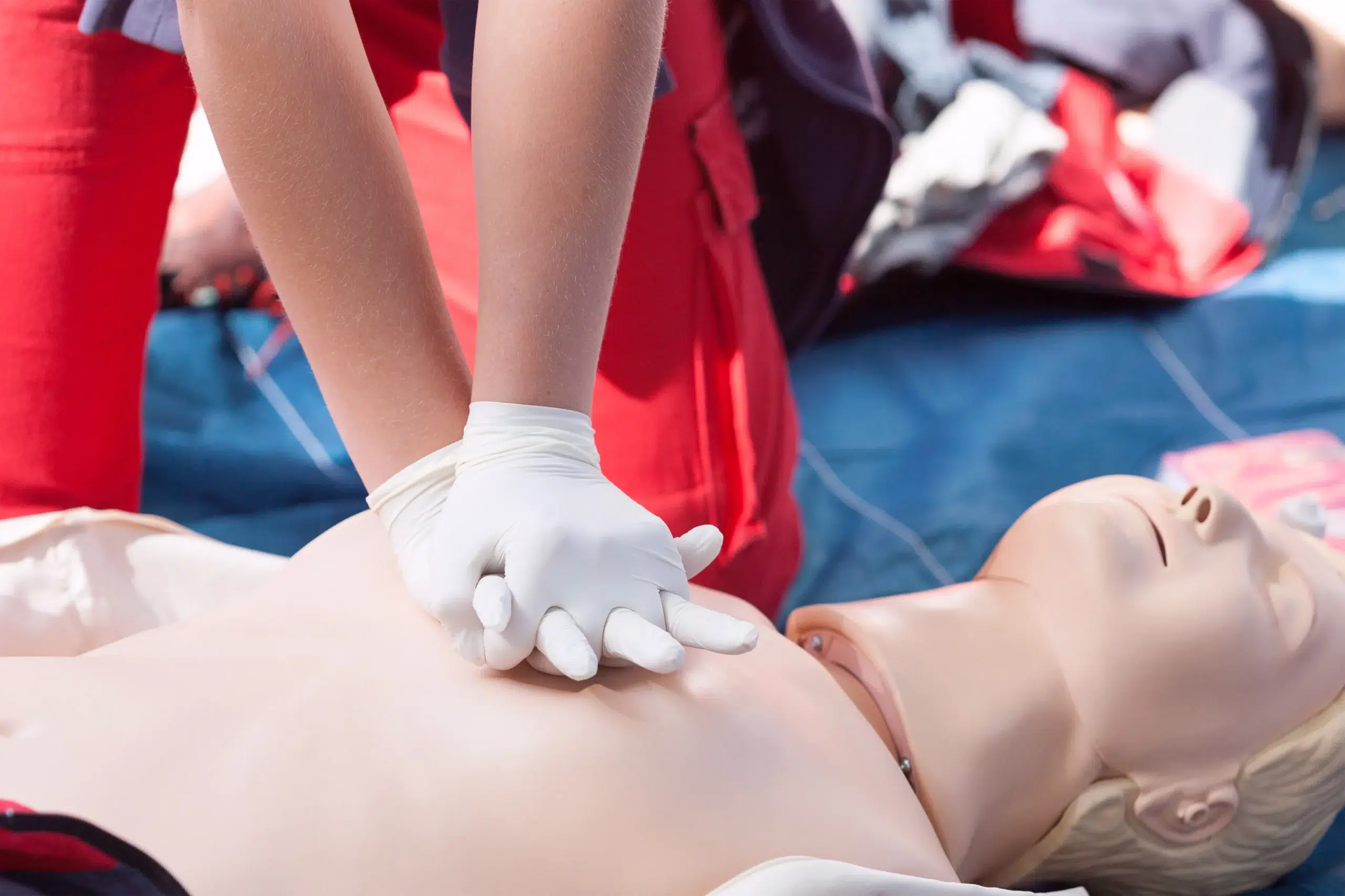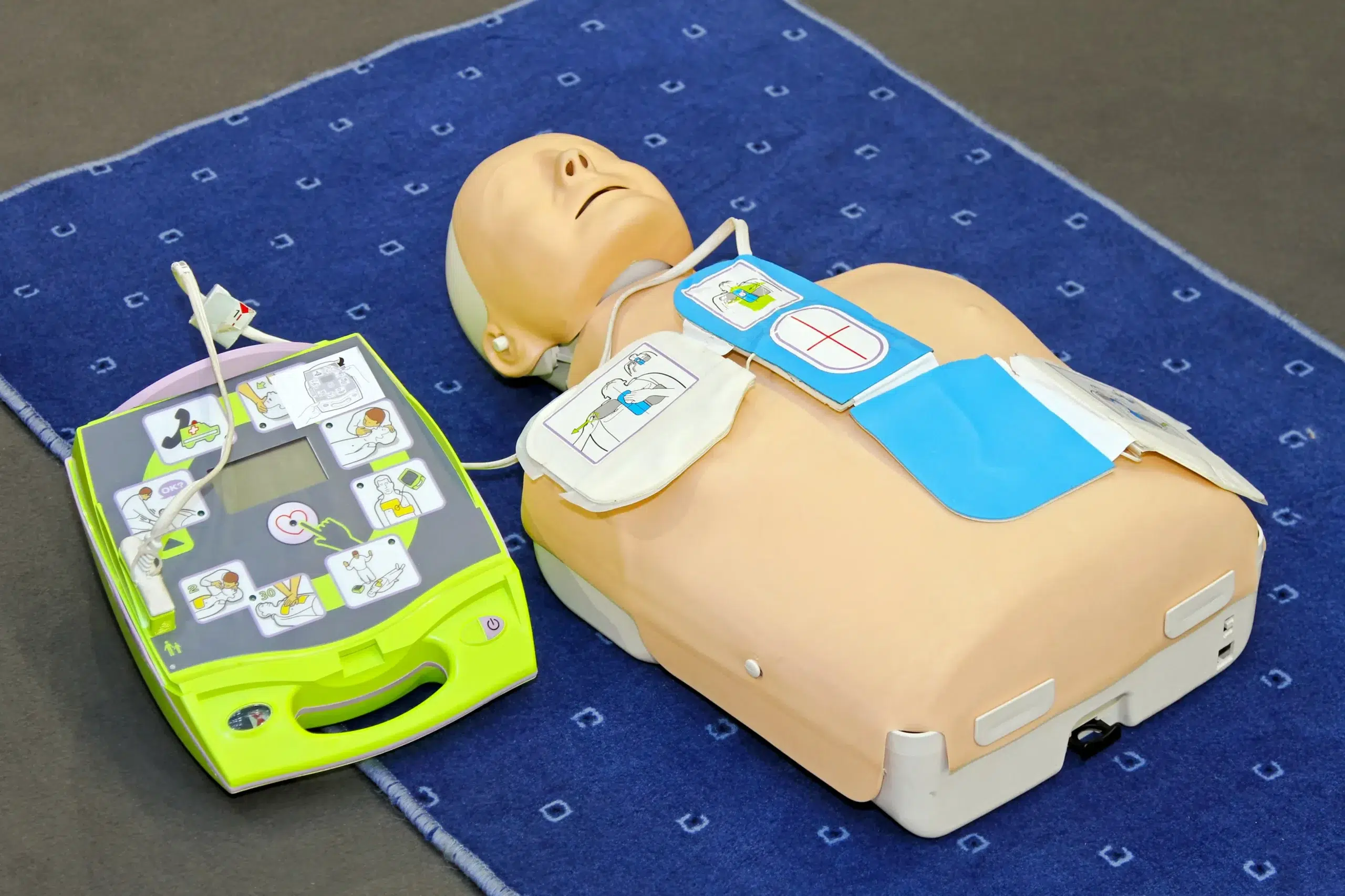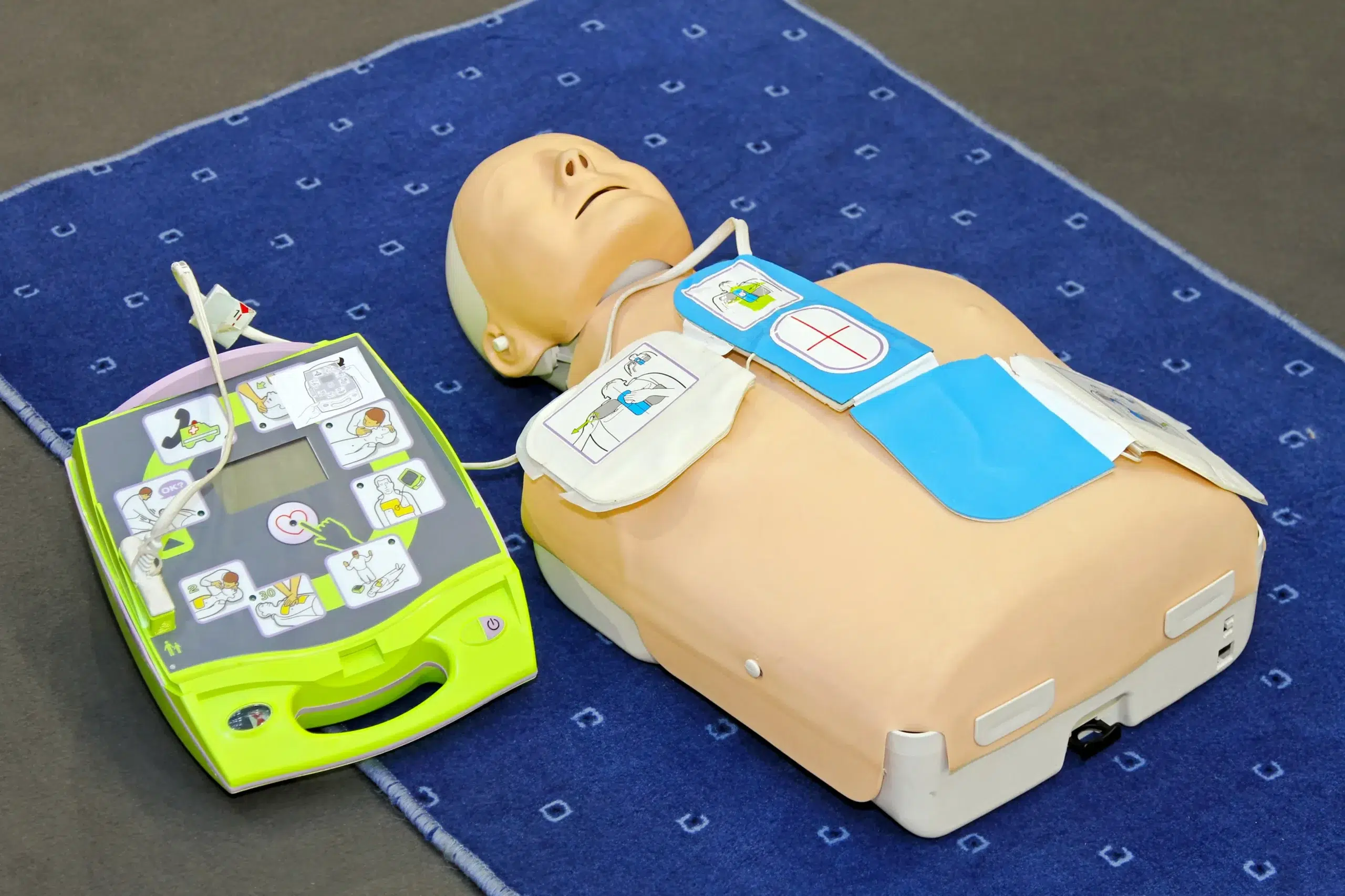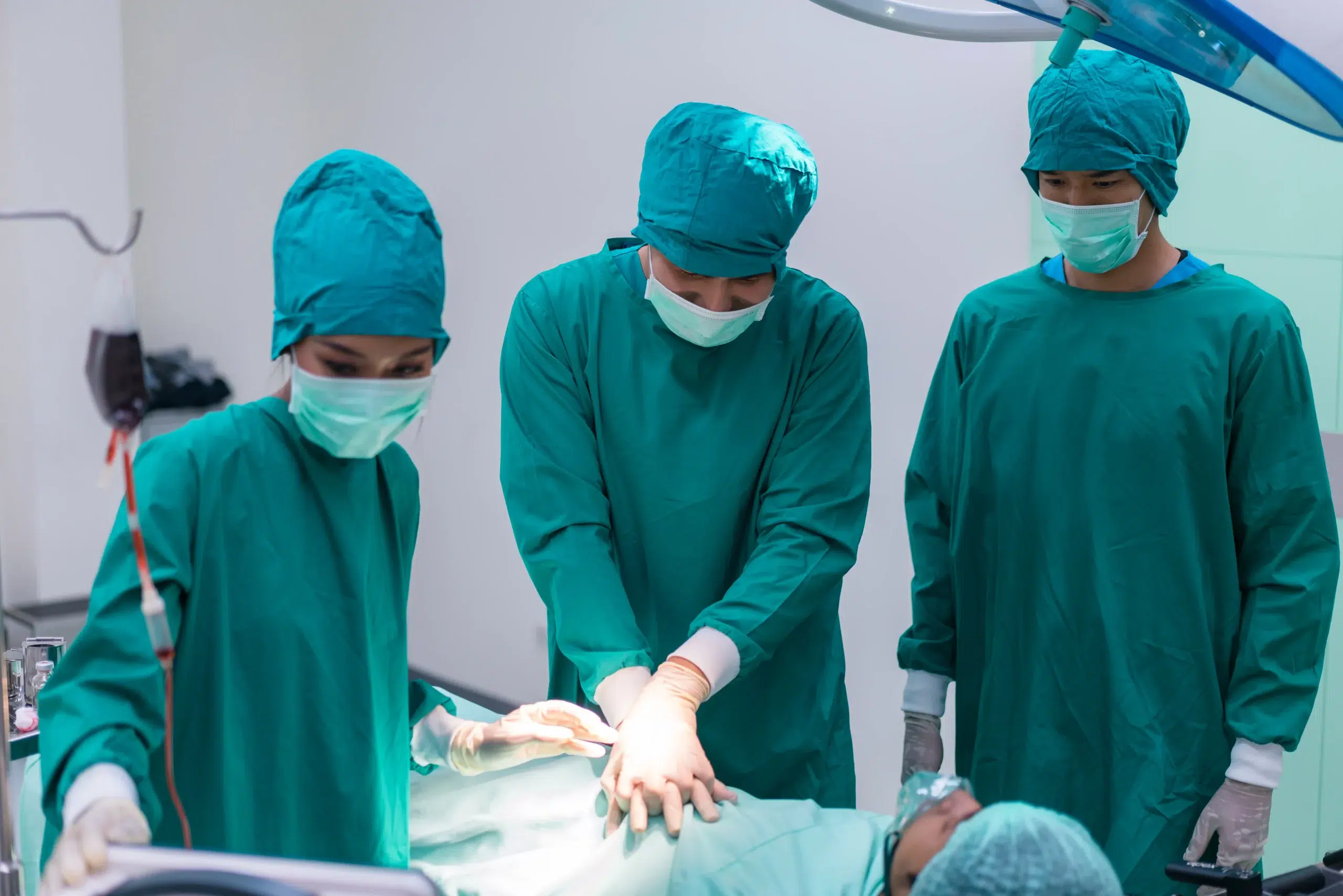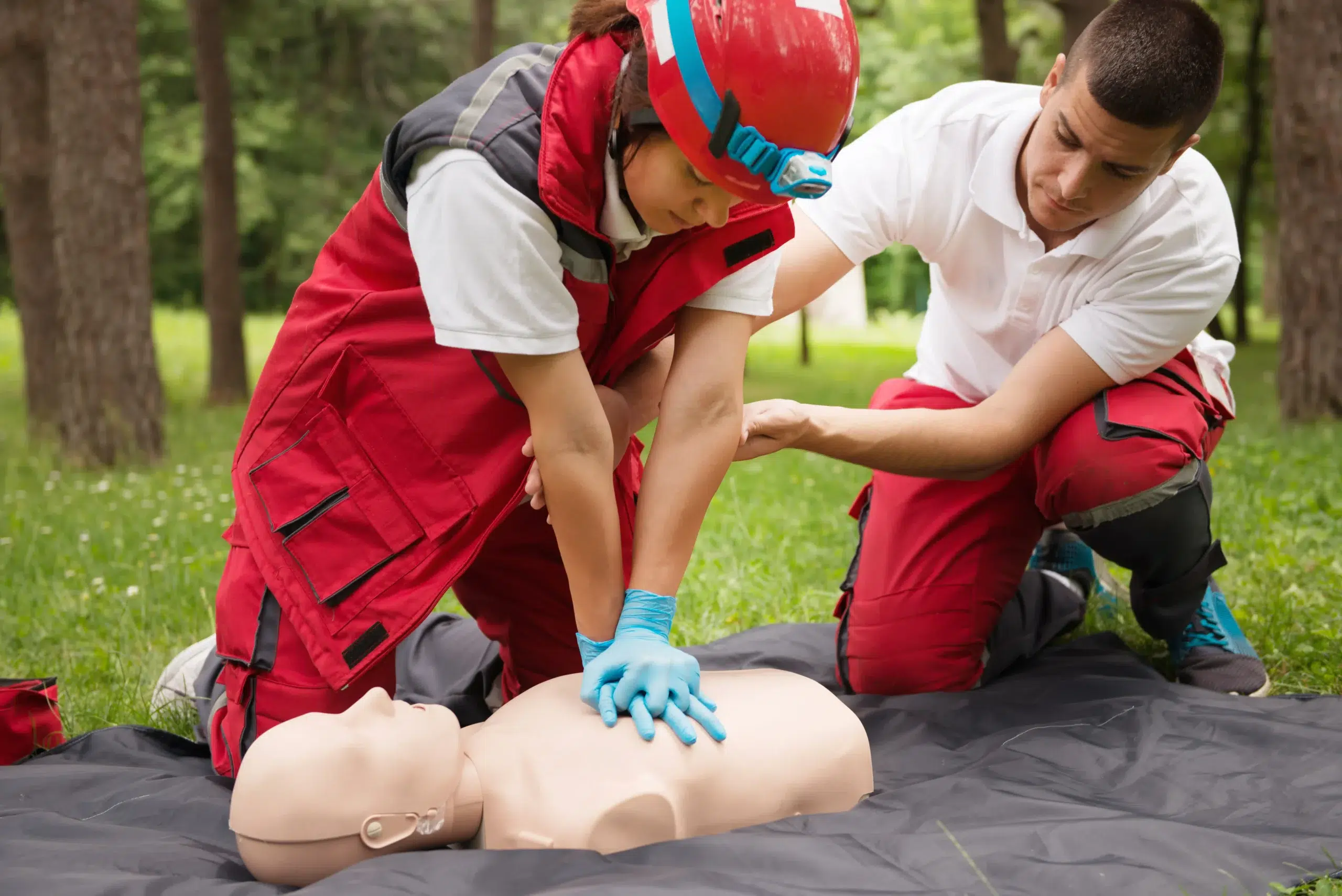Empowering yourself with life-saving skills starts with CPR training. In Oakland, numerous opportunities exist to become certified and prepared for medical emergencies. This guide navigates the CPR training Oakland landscape, providing insights into various courses, certification processes, and leading training providers. Whether you’re a healthcare professional seeking advanced certification or a community member wanting to learn basic life support, we’ll help you find the right CPR training in Oakland to match your needs and goals.
Key Takeaways
- CPR training empowers you to respond to emergencies: Learn essential lifesaving skills and gain the confidence to act quickly and effectively in medical crises. Find an Oakland course that suits your needs, whether you’re a healthcare provider, part of a workplace safety team, or simply a prepared community member.
- Oakland offers a variety of CPR courses: Explore different providers, course types (BLS, ACLS, PALS, First Aid), and schedules to find the best fit. Consider factors like cost, location, and certification requirements. Check out Oakland CPR Courses for competitive pricing and group discounts.
- Maintain your CPR skills through practice and recertification: Stay prepared by regularly practicing your skills and recertifying as needed to ensure you’re always ready to assist in an emergency. This ongoing commitment reinforces your knowledge and maintains your ability to respond effectively.
What is CPR Training?
CPR (Cardiopulmonary Resuscitation) training teaches you how to respond to medical emergencies where someone’s breathing or heartbeat has stopped. This training covers chest compressions and rescue breaths, which are essential for maintaining blood flow and oxygen to the brain and other vital organs. Learning CPR can significantly increase the chances of survival for someone experiencing cardiac arrest.
CPR training is valuable for anyone who wants to be prepared for a medical emergency. Many organizations offer CPR courses in Oakland for various needs, from workplace safety to family preparedness. These courses empower individuals to confidently respond in a crisis. For professional certification, programs like the American Heart Association’s RQI program offer a streamlined path to BLS, ACLS, and PALS certification. These certifications are especially important for healthcare providers.
CPR Courses in Oakland
Finding the right CPR course can feel overwhelming, but it doesn’t have to be. This section breaks down the different types of CPR training available in Oakland, so you can choose the best fit for your needs.
Adult CPR/AED
Adult CPR/AED courses teach you the essential skills to respond to cardiac emergencies in adults. You’ll learn how to recognize the signs of a heart attack, perform chest compressions, provide rescue breaths, and use an automated external defibrillator (AED). These courses are ideal for anyone who wants to be prepared for an emergency, including community members, workplace responders, and those seeking general CPR knowledge. For those in Oakland, CPR Certification Oakland offers AHA-certified CPR and First Aid classes covering these lifesaving skills.
First Aid + CPR
Combining First Aid and CPR training equips you to handle a broader range of emergencies. In addition to CPR/AED skills, you’ll learn how to manage injuries like cuts, burns, fractures, and choking. This comprehensive training is valuable for anyone, but especially beneficial for those working in childcare, education, or other fields where responding to various emergencies is common. CPR Certification Oakland provides this combined training in the Oakland area.
BLS for Healthcare Providers
BLS for Healthcare Providers courses are designed for medical professionals, including doctors, nurses, paramedics, and other licensed healthcare providers. These courses cover advanced lifesaving techniques, including two-rescuer CPR, airway management, and the use of bag-mask devices. Oakland healthcare professionals can obtain their BLS certification through the American Heart Association RQI program.
ACLS
Advanced Cardiovascular Life Support (ACLS) training builds upon BLS skills and focuses on managing cardiovascular emergencies, including heart attacks, strokes, and respiratory arrest. This course is essential for healthcare professionals working in critical care settings, emergency rooms, and intensive care units. Safety Training Seminars offers AHA-certified ACLS courses in Oakland.
PALS
Pediatric Advanced Life Support (PALS) training focuses on the specialized techniques required to respond to life-threatening emergencies in infants and children. This course is crucial for healthcare providers working in pediatrics, neonatal intensive care units, and emergency departments. Oakland healthcare providers can find PALS courses through Safety Training Seminars, certified by the American Heart Association.
Top Oakland CPR Training Providers
Finding the right CPR training provider is crucial for a positive and effective learning experience. Here’s a look at some of the leading CPR training providers in Oakland:
Oakland CPR Courses
Oakland CPR Courses partners with Safety Training Seminars, a certified training center, to offer comprehensive CPR, BLS, ACLS, PALS, and First Aid training. They prioritize excellent customer service and competitive pricing, making them a popular choice for individuals and groups in Oakland, Alameda, and Berkeley. You can explore their BLS, ACLS, and PALS certifications on their website. They also offer group discounts and a low-price guarantee.
American Red Cross
The American Red Cross is a well-known provider of CPR and First Aid training in Oakland. Their classes cater to individuals, first responders, organizations, and schools. The Red Cross focuses on convenient scheduling and offers courses at various locations. Learn more about their CPR classes and certification.
Safety Training Seminars
Safety Training Seminars provides American Heart Association (AHA) certified courses, including CPR, BLS, ACLS, and PALS, in Oakland and surrounding areas. They offer daily classes, ensuring flexibility for busy schedules. Visit the Safety Training Seminars website for more information.
CPR Certification Oakland
CPR Certification Oakland offers AHA-certified CPR and First Aid classes in Oakland and other Bay Area locations. They provide same-day certification cards and on-site training for groups. Visit their website for details on class schedules and locations.
CPR Training Costs & Value
Understanding CPR training costs and the value you receive is essential when choosing a course. This section breaks down typical expenses, explores available discounts, and highlights Oakland CPR Courses’ commitment to competitive pricing.
Course Costs
CPR training costs in Oakland vary depending on the provider and the type of course. Basic CPR certification classes typically range from $60 to $90. For example, CPR Certification Oakland offers American Heart Association (AHA) certified CPR classes for $64.95, while their combined First Aid and CPR course is $84.95. These classes usually last about three hours. The Red Cross also provides CPR classes and certification in Oakland, with certifications valid for two years. Checking with different providers for their most up-to-date pricing is always a good idea.
Group Discounts & Offers
If you need training for a group, such as employees or community members, explore group discounts. Many training providers offer reduced rates for group bookings or package deals that combine courses. CPR Certification Oakland offers convenient on-site training for groups, allowing organizations to train their staff efficiently. The Red Cross also has tailored training programs for schools, covering both staff and students. Contacting providers directly to discuss your group’s needs and explore potential cost savings is always recommended. For competitive group rates, check out Oakland CPR Courses group discounts.
Oakland CPR Courses’ Price Guarantee
At Oakland CPR Courses, we believe high-quality CPR training should be accessible to everyone. We offer competitive pricing and a low-price guarantee to ensure you receive excellent value. Our training is comprehensive and accepted by employers, giving you the skills to confidently respond to emergencies. We’re committed to providing top-notch instruction and convenient class schedules to serve the Oakland, Alameda, and Berkeley communities.
CPR Training Duration & Certification
CPR certification equips you to handle emergencies, but how long does it take to get certified, and how long does the certification last? Let’s clarify.
Class Lengths
CPR training classes typically run for about three hours. This duration allows for a good balance of instruction and hands-on practice, ensuring you feel comfortable with the techniques. Oakland CPR Courses offers a variety of class times to accommodate busy schedules. Visit our website to find a class that works for you.
Skills Assessments & Certification
Once you’ve completed the training, you’ll participate in a skills assessment covering essential areas such as primary assessments, ventilations, choking, CPR, and AED use. Upon successful completion, you’ll receive an official certification card, valid for two years. This certification validates your skills and may be a requirement for certain professions or volunteer opportunities.
Certification Renewal
CPR certifications expire after two years. To stay current and maintain your skills, you’ll need to recertify. The process is straightforward, with recertification courses designed to refresh your knowledge and ensure you’re up-to-date on the latest guidelines. Oakland CPR Courses provides convenient recertification classes to help you maintain your qualifications and remain prepared for emergencies.
Choose the Right CPR Course
Knowing which CPR course best suits your needs depends on your background and goals. Whether you’re a healthcare provider, an employee needing workplace training, or simply someone wanting to learn life-saving skills, Oakland has a CPR course for you.
For Healthcare Professionals
Healthcare professionals in Oakland often choose the American Heart Association’s RQI (Resuscitation Quality Improvement) program to maintain their certifications. This program offers a flexible and convenient way to renew BLS, ACLS, and PALS certifications, ensuring providers stay current with the latest resuscitation guidelines. It’s designed to fit busy schedules and emphasizes high-quality CPR skills.
For Workplace Safety
Many workplaces in Oakland require employees to have CPR and First Aid training. These courses cover essential life-saving techniques and often fulfill OSHA requirements. Check with your employer to determine what specific certifications they require. Group discounts may be available through training providers like Oakland CPR Courses.
For the Public & Families
Individuals and families in Oakland can find CPR and First Aid training through organizations like the Red Cross. These community courses teach basic life support skills, empowering people to respond effectively in emergencies. Learning CPR and First Aid provides valuable skills and the confidence to potentially save a life. The Red Cross also offers specialized programs for schools and community groups.
What Happens During CPR Training?
CPR training blends classroom learning with hands-on practice to prepare you for real-life emergencies. You’ll learn essential skills and gain the confidence to respond effectively. Here’s a closer look at what a typical CPR class entails:
Classroom vs. Hands-On
CPR training begins with fundamental concepts and techniques taught in a classroom setting. Instructors explain how to assess a situation, recognize the signs of a cardiac arrest, and activate the emergency response system. They’ll cover essential skills like performing chest compressions, giving rescue breaths (ventilations), and assisting someone who is choking. This foundational knowledge is then reinforced through hands-on training using mannequins. You’ll have the opportunity to practice CPR techniques on adult, child, and infant mannequins, learning how to adapt your approach based on the age of the person needing assistance. Many courses, including those offered by the Red Cross, also incorporate training on using an automated external defibrillator (AED).
Equipment & Materials
Access to high-quality training materials is essential for effective learning. Expect resources like manuals and online materials that reinforce key concepts and allow you to review the information after class. Hands-on practice with equipment like CPR mannequins and AED training devices is a crucial part of the learning process. These experiences help develop muscle memory and build comfort performing CPR in a stressful situation.
Instructor Qualifications
Certified instructors guide you through the training process, ensuring you learn the most up-to-date techniques based on the latest scientific guidelines from organizations like the American Heart Association. These instructors undergo rigorous training and maintain current certifications. They are prepared to answer your questions, provide personalized feedback, and create a supportive learning environment. When choosing a CPR course, look for training centers like Oakland CPR Courses, which prioritize experienced instructors committed to delivering high-quality instruction. This focus on current best practices and adherence to established guidelines ensures you receive comprehensive and reliable training.
Benefits of CPR Training
Learning CPR offers significant advantages, from personal growth to career development. It empowers you to handle emergencies effectively, strengthens community bonds, and can even open doors to new opportunities.
Confidence in Emergencies
CPR training equips you with the knowledge and skills to respond confidently during emergencies. Understanding CPR dispels common misconceptions and empowers you to take action when every second counts. Regularly practicing your CPR skills, as highlighted by Heartline CPR, ensures you’re prepared to respond effectively and potentially save lives. This confidence can extend beyond medical emergencies, fostering a greater sense of self-reliance in various challenging situations.
Community Safety
CPR training creates a ripple effect, enhancing the safety of your entire community. When more people are trained, the response time to begin CPR is significantly reduced, improving a victim’s chances of survival. MyCPR NOW emphasizes the importance of community involvement in CPR training to build a network of lifesavers. By learning CPR, you become an active participant in creating a safer environment for everyone.
Career Advancement
CPR certification is a valuable asset in many professions. For healthcare professionals, maintaining current certifications like BLS, ACLS, and PALS through programs like the American Heart Association RQI is often a job requirement. In other fields, CPR and first-aid certifications can enhance your resume and create new opportunities, demonstrating your commitment to safety and preparedness.
Common CPR Concerns
It’s normal to have questions or concerns about CPR training. Let’s address some common myths and discuss how to overcome any hesitation you might feel.
Myths vs. Facts
One common misconception is that CPR always revives someone experiencing cardiac arrest. CPR can dramatically improve survival odds, but it’s not a guarantee. This misconception can lead to hesitation in a real emergency. Every second counts, so starting CPR promptly is crucial, even if you’re unsure of the outcome. Another myth is that only medical professionals can perform CPR. The truth is, anyone can learn CPR and potentially save a life. Learn more about these common CPR myths.
Overcoming CPR Hesitation
Understanding the facts about CPR is the first step to feeling confident in an emergency. Debunking these myths empowers people to act quickly and effectively. When trained community members are present, the response time for CPR is significantly reduced, which improves the victim’s chances of survival. Comprehensive CPR training builds skills and confidence, preparing individuals to respond effectively. Oakland CPR Courses offers a variety of group discounts to make training accessible. Knowing you have the skills to help can make a real difference. Learn how to overcome CPR hesitation.
Start CPR Training in Oakland
Ready to become CPR certified? Here’s how to get started with CPR training in Oakland.
Enroll in a Course
Finding the right CPR class is the first step. Several organizations offer CPR certification in Oakland, including Oakland CPR Courses, the American Red Cross, and CPR Certification Oakland. Look for a course that fits your schedule and learning style. Oakland CPR Courses offers daily classes through Safety Training Seminars and provides official certification cards upon completion. Many providers offer various levels of CPR training, from basic life support (BLS) for healthcare providers to CPR/AED training for the general public. Consider which certification level you need based on your personal or professional goals. Oakland CPR Courses also offers ACLS and PALS certification courses.
Prepare for Training
Once you’ve chosen a course, prepare beforehand. If your provider offers blended learning (a mix of online and in-person instruction), review the online materials first. This will give you a head start and allow you to focus on hands-on skills practice during the in-person session. Familiarize yourself with basic CPR principles. Even a little pre-course preparation can boost your confidence and skill development.
Post-Certification & Continuing Ed
Congratulations on completing your CPR training! Now, maintain those skills. Regular practice and refresher courses are essential. Consider scheduling refresher training annually or as recommended by your certifying organization. Practice your skills with friends or family members who are also certified. Some organizations offer resources to help you stay sharp between classes. Staying up-to-date on your CPR skills means you’ll be ready to respond effectively in an emergency. Consider connecting with other CPR-trained individuals in your community to share knowledge and practice together.
Related Articles
- CPR Training in Oakland: Your Complete Guide – Oakland CPR Classes
- The Science Behind Effective CPR: A Comprehensive Guide
- The Importance of CPR in Saving Lives – Oakland CPR Classes
- CPR, BLS, ACLS, PALS, & First-aid Courses in Oakland, CA
- Life-Saving Workplace CPR and First-Aid Training in Oakland
Frequently Asked Questions
What’s the difference between CPR and First Aid? CPR focuses specifically on restoring breathing and circulation when someone’s heart has stopped. First Aid covers a wider range of injuries and illnesses, from cuts and burns to allergic reactions and heatstroke. While distinct, they complement each other, providing a comprehensive approach to emergency care. Many courses combine CPR and First Aid training, equipping you to handle various situations.
How long does CPR certification last, and how do I renew it? CPR certification is typically valid for two years. Renewal involves taking a recertification course to refresh your skills and ensure you’re up-to-date on the latest guidelines. It’s a straightforward process designed to maintain your proficiency and confidence in responding to emergencies.
Which CPR course is right for me? The best course depends on your individual needs. Healthcare providers often require BLS, ACLS, or PALS certification. If you need CPR training for your job, check with your employer for specific requirements. For general knowledge and preparedness, a basic CPR/AED or combined CPR/First Aid course is a great option.
What if I’m nervous about performing CPR in a real emergency? It’s completely normal to feel apprehensive. High-quality CPR training addresses these concerns by building confidence through hands-on practice and realistic scenarios. Remember, any attempt at CPR is better than none. Your training will kick in, and you’ll be able to focus on providing essential support until professional help arrives.
How much does CPR training cost in Oakland? Costs vary depending on the provider and the type of course. Basic CPR classes typically range from $60 to $90. Many providers offer group discounts, so if you’re training with friends, family, or colleagues, inquire about reduced rates. Some organizations also offer financial assistance programs, making training accessible to more people. Check with your chosen provider for the most up-to-date pricing information.


